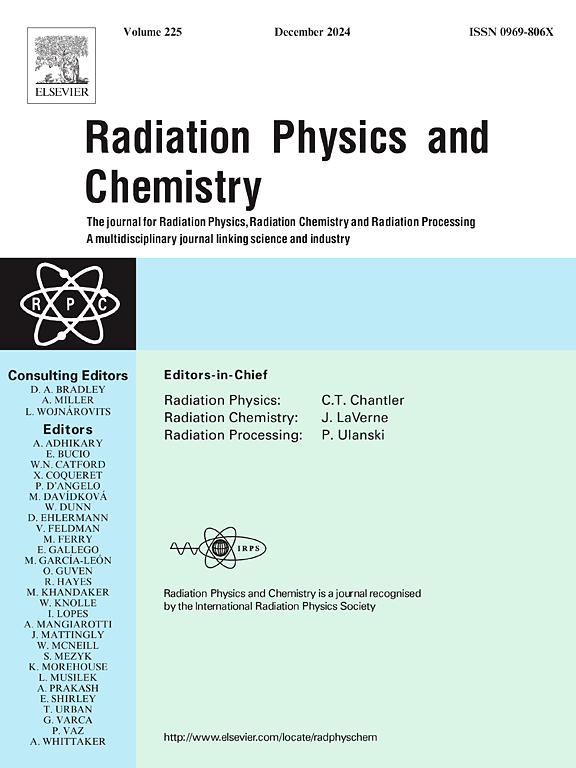用丙氨酸/ESR剂量法验证闪质子治疗的常规质子校准
IF 2.8
3区 物理与天体物理
Q3 CHEMISTRY, PHYSICAL
引用次数: 0
摘要
本研究评估了丙氨酸/ESR剂量法作为超高剂量率(Flash)质子治疗质量保证(QA)的实用替代电离室的可行性。电离室虽然是临床金标准,但由于离子重组和电荷收集损失,在闪蒸条件下准确性降低。丙氨酸剂量计在高剂量下表现出最小的剂量率依赖性和优异的稳定性,但其在闪速质子束中的性能尚未完全确定。在常规质子束(10-100 Gy)条件下,建立了esr剂量校准曲线,线性关系良好(R2 = 0.9998),与离子室参考剂量偏差在1.25%以内。在闪光条件下,未经校正的esr剂量比离子室读数高出4.0%,这是几何特定因素造成的偏差。蒙特卡罗模拟量化了丙氨酸颗粒相对于电离室高3.0%的剂量,产生了1.03的校正因子。应用该因子可将残余偏差降低到±1.68%以内,且无剂量依赖偏差。这些研究结果表明,丙氨酸/ESR剂量法可以使用传统的校准曲线准确地验证Flash质子剂量,支持其作为标准和超高剂量率质子治疗中可靠的、条件无关的质量保证工具。本文章由计算机程序翻译,如有差异,请以英文原文为准。
Validation of conventional proton calibration for flash proton therapy with Alanine/ESR dosimetry
This study evaluated the feasibility of alanine/ESR dosimetry as a practical alternative to ionization chambers for quality assurance (QA) in ultra-high dose rate (Flash) proton therapy. Ionization chambers, although the clinical gold standard, suffer from reduced accuracy under Flash conditions due to ion recombination and charge collection losses. Alanine dosimeters exhibit minimal dose-rate dependence and excellent stability at high doses, yet their performance in Flash proton beams has not been fully established. An ESR-dose calibration curve was generated under conventional proton beam conditions (10–100 Gy), demonstrating excellent linearity (R2 = 0.9998) with deviations from ion-chamber reference doses within 1.25%. Under Flash conditions, uncorrected ESR-based doses were up to 4.0% higher than ion-chamber readings, a bias attributed to geometry-specific factors. Monte Carlo simulations quantified a 3.0% higher dose to the alanine pellet relative to the ionization chamber, yielding a correction factor of 1.03. Applying this factor reduced residual deviations to within ± 1.68% without dose-dependent bias. These findings demonstrate that alanine/ESR dosimetry can accurately verify Flash proton doses using a conventional calibration curve, supporting its use as a reliable, condition-independent QA tool in both standard and ultra-high dose rate proton therapy.
求助全文
通过发布文献求助,成功后即可免费获取论文全文。
去求助
来源期刊

Radiation Physics and Chemistry
化学-核科学技术
CiteScore
5.60
自引率
17.20%
发文量
574
审稿时长
12 weeks
期刊介绍:
Radiation Physics and Chemistry is a multidisciplinary journal that provides a medium for publication of substantial and original papers, reviews, and short communications which focus on research and developments involving ionizing radiation in radiation physics, radiation chemistry and radiation processing.
The journal aims to publish papers with significance to an international audience, containing substantial novelty and scientific impact. The Editors reserve the rights to reject, with or without external review, papers that do not meet these criteria. This could include papers that are very similar to previous publications, only with changed target substrates, employed materials, analyzed sites and experimental methods, report results without presenting new insights and/or hypothesis testing, or do not focus on the radiation effects.
 求助内容:
求助内容: 应助结果提醒方式:
应助结果提醒方式:


